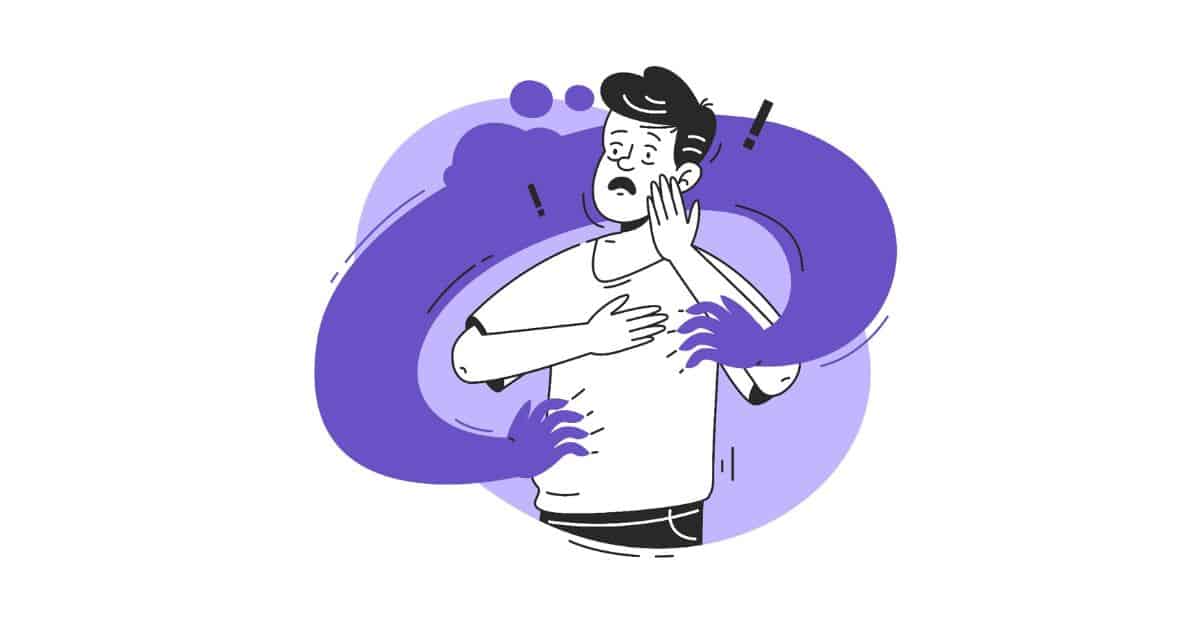Have you ever had the unsettling feeling that someone is watching you, even when you’re completely alone? Maybe you’re walking to your car at night, or sitting in your room with no one around—but you just can’t shake the sense that you’re being observed. If this happens often, you might be wondering: Is this anxiety? Is something wrong with me?
You’re not alone in feeling this way. This sensation is more common than people realize—and for many, it’s linked to anxiety disorders. In this post, we’ll explore why you might feel this way, what it means, and how to find relief.
That Unshakable Feeling — What It Really Means
That persistent feeling of being watched, followed, or unsafe—especially when there’s no actual threat—can be deeply uncomfortable. For some, it happens occasionally. For others, it’s a daily struggle.
This experience isn’t necessarily paranoia or a sign of something serious like psychosis. Instead, it can often be traced back to anxiety, especially when you’re in a heightened state of alertness known as hypervigilance. This is your brain’s way of trying to protect you, but sometimes it goes into overdrive.
The Link Between Anxiety and Feeling Watched
Anxiety is your body’s natural response to stress or danger—but when it becomes chronic, it can distort your perception of risk. One way this shows up is by creating the sense that you’re being watched or that something bad is about to happen.
This reaction is especially common in people with:
- Generalized Anxiety Disorder (GAD)
- Panic Disorder
- Social Anxiety Disorder
- Post-Traumatic Stress Disorder (PTSD)
In all of these conditions, your nervous system is on high alert. Your brain may interpret neutral situations—like being alone or hearing a sound—as threatening.
To learn more about trauma-related symptoms, visit our post on common triggers for relapsing on drugs and alcohol.
What Is Generalized Anxiety Disorder (GAD)?
Generalized Anxiety Disorder is one of the most common types of anxiety. People with GAD often feel worried or on edge most days, even when there’s no clear reason.
Common Symptoms of GAD:
- Excessive worry about everyday situations
- Feeling restless or on edge
- Muscle tension
- Trouble sleeping
- Trouble concentrating
- Feeling easily startled
When your brain is constantly scanning for threats, it makes sense that you might feel like someone is watching you—even if there’s no real danger. This is hypervigilance, and it’s a survival mechanism that’s stuck in overdrive.
Symptoms of Anxiety That Might Explain This Feeling
If you’re wondering whether anxiety could be behind your constant sense of being watched, here are some symptoms to look out for:
- Hypervigilance: Always scanning your surroundings, easily startled
- Racing thoughts: A stream of thoughts that won’t slow down
- Intrusive thoughts: Unwanted thoughts that pop into your head and make you feel unsafe or unsettled
- Sleep issues: Trouble falling or staying asleep
- Difficulty focusing: Feeling “on edge” makes it hard to concentrate
- Physical tension: Jaw clenching, muscle aches, restlessness
These symptoms often reinforce each other. When your mind is anxious, your body tenses up, and you become more sensitive to sights and sounds—fueling the feeling that you’re being watched.
Is It Anxiety — Or Something Else?
It’s important to note that feeling like you’re being watched isn’t automatically a sign of something serious like psychosis or schizophrenia. In most cases, especially when paired with other anxiety symptoms, it’s a sign of severe anxiety or trauma-related hypervigilance.
If you’re unsure, a mental health professional can help clarify what’s going on—and guide you to the right kind of support.
Types of Anxiety Disorders That Include Hypervigilance
This symptom isn’t exclusive to GAD. You might also experience it with:
Social Anxiety Disorder
Worry about being judged or watched by others—even in harmless situations.
Panic Disorder
Sudden feelings of terror, often paired with physical symptoms like chest pain or shortness of breath.
PTSD
Triggered by past trauma; hypervigilance is a protective response to feeling unsafe.
Obsessive-Compulsive Disorder (OCD)
Intrusive thoughts can sometimes create false perceptions of threat or danger.
To see how Silver Lining Recovery addresses multiple forms of anxiety, explore our anxiety treatment services.
Why Do I Have Anxiety in the First Place?
You might ask yourself, “Why do I feel this way when nothing is actually wrong?”
That’s a good question—and a valid one. Anxiety doesn’t always have a clear cause, but common contributors include:
- Genetics: Family history of anxiety or depression
- Stress: Chronic stress at work, school, or home
- Personality traits: Perfectionism, people-pleasing, overthinking
- Trauma: Past emotional or physical trauma
- Brain chemistry: Imbalances in serotonin and other neurotransmitters
It’s not your fault, and you’re not broken. Your brain is trying to protect you—it just needs some help calming down.
What You Can Do About It
The good news is that there are proven ways to reduce anxiety, including that unnerving feeling of being watched. Here’s where to start:
Try the 5-4-3-2-1 technique to bring yourself back into the moment:
- 5 things you can see
- 4 things you can feel
- 3 things you can hear
- 2 things you can smell
- 1 thing you can taste
If therapy and lifestyle changes aren’t enough, Transcranial Magnetic Stimulation (TMS) may help. It’s a non-invasive, medication-free treatment for anxiety and depression.
When to Reach Out for Help
If anxiety is starting to interfere with your daily life, relationships, or ability to rest—it’s time to get support.
Some signs you should talk to a professional:
- You’re constantly feeling unsafe, even at home
- The feeling of being watched is keeping you up at night
- You’re avoiding situations or places because of anxiety
- You’ve experienced trauma and never felt safe since
Learn more about how we help with co-occurring issues in our dual diagnosis treatment program.
Living with Anxiety — You’re Not Alone
Anxiety can make you feel like you’re broken or that something is wrong with you—but that’s not true. You’re human. And your brain is doing its best to protect you, even when it doesn’t feel that way.
At Silver Lining Recovery, we help people just like you find peace, relief, and a path forward. You don’t have to keep living in fear or discomfort. The first step is reaching out.
FAQs: Anxiety, Intrusive Thoughts, and Feeling Watched
Ready to Take the Next Step?
If you’re in Orange County or Huntington Beach, CA, and you’re ready to get help for your anxiety, Silver Lining Recovery is here for you.
We offer compassionate, evidence-based care tailored to your needs—including TMS therapy, outpatient treatment, and individualized support.
👉 Contact us today to schedule a consultation and take your first step toward peace of mind.











